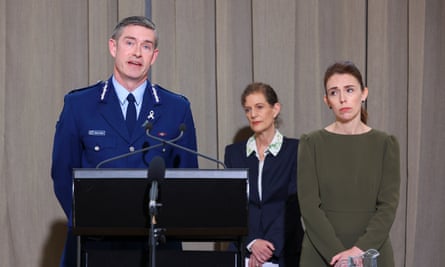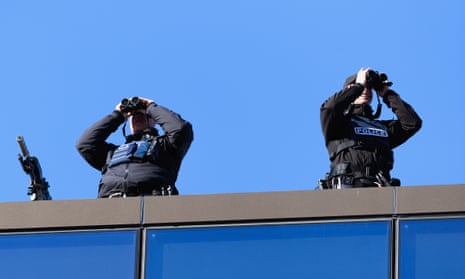In the early hours of an October morning in 2007, teams of armed police stormed Rūātoki, a lush green valley in the North Island of New Zealand. Equipped with new anti-terrorism powers, they stopped school buses, set up roadblocks, raided houses, arrested 18 people across the country, and detained many more in their homes for hours.
“I was only 7 at the time,” Kunere Timoti, one of the children caught up in the raids told the New Zealand Herald. “I remember the bus stopping and then looking out my window… What I saw then will stay with me forever,” he said. Outside, a balaclava-clad man had a gun pointed at the bus. Whetumarama Purewa, who was six years old at the time, told The Hui that 10 years on from the raids, she still hasn’t forgotten. “I still feel hurt, I think all of us still feel hurt, we all still feel that trauma that they did to us. Not just to us – the things like they pointed guns at them and they didn’t even do anything wrong.”
Dubbed “Operation 8”, it was New Zealand’s largest domestic anti-terror operation, involving 300 police officers. The valley they descended upon is populated by Ngāi Tūhoe, an indigenous Māori tribe who had never ceded sovereignty to the crown. Police alleged that a group there was running terrorist training camps in the Te Urewera forests. The defence said the camp had been focused on bushcraft, hunting, and bootcamp-style training to get people off government benefits.
In court, the police terrorism case eventually crumbled: none of the 18 people arrested faced charges under the Terrorism Suppression Act, after the solicitor-general ruled that the evidence was insufficient. Four were eventually found guilty of illegally possessing firearms. An investigation by the Independent Police Conduct Authority ruled that parts of the raids were unlawful and unreasonable, and in 2014, police formally apologised for the wrongdoing and hurt that they inflicted on Tūhoe during the raids.
Today, the memory of Operation 8 still looms as New Zealand’s largest, most controversial counter-terror operation. As the country now looks to expand its terror laws again, experts are questioning whether there are sufficient protections and oversights for the state.
The aftermath of Christchurch
The government announced new legislation to expand its anti-terror laws in April. The changes were introduced in direct response to New Zealand’s worst mass shooting and terrorist attack: the March 2019 attack on two mosques in Christchurch, where white supremacist Brenton Tarrant murdered 51 people. A royal commission in the aftermath of the attacks recommended a number of changes, including updates to terror legislation. The new laws will criminalise planning or preparing for a terror act, even if there is no attempt to carry one out. They also criminalise weapons training or combat training for terrorist purposes, and give the police warrantless powers of entry, search and surveillance when suspecting someone of planning an attack.

The 15 March attacks were greeted with widespread condemnation in New Zealand, and there is little argument – among politicians or the general public – that they demanded a full reckoning, from both authorities and New Zealanders. But experts, activists, and even some survivors have questioned the expansion of the terror laws, who they could ultimately target, and whether there is enough oversight for police and security forces. On Wednesday, internal documents released to RNZ found problems and failings within New Zealand’s police intelligence services that had little to do with their legislated powers. Internal communications found low pay, high staff turnover, a lack of planning, “no clear lead to counter radicalisation” and a “huge variance in capability and experience across intelligence”.
This month, prime minister Jacinda Ardern said the proposed changes would not necessarily have prevented the 15 March attacks. “No, there’s no suggestion that had the legislation – the Terrorism Suppression Act – been any different, that it would have necessarily led to a different situation,” Ardern said.
As the Christchurch gunman hunted through Al Noor mosque, Atacocugu attempted to hide among the bodies that surrounded him. “I thought I was going to die. I tried to lie as still as possible,” he told the court. “I couldn’t move or make a sound as the gunman would have executed me as he did the others. Six bullets were removed from my body but three remain.”
In the months since, Atacocugu has been critical of the state, which he says has a record of targeting Muslims – both through racial profiling at the border, and through counter-terror surveillance.
“We’re targeted especially, the Muslim communities,” Atacocugu told Newshub. “[It’s] the issue with spying in New Zealand.”
A balancing act
Te Rangikaiwhiria Kemara (Ngāti Mahuri, Ngāti Urunumia) was one of the four convicted on gun-possession charges following Operation 8. Today, he is an online security consultant and monitors white supremacist, neo-fascist and islamophobic activity online. “In my view, under existing criminal law, Brenton Tarrant and those that supported him in the lead up to his atrocities, could easily have been detected, investigated, arrested, tried and convicted for planning these attacks,” Kemara said. “The issue here is not that the police need extended powers, but rather that they are deeply colour-blind, and powers to carry out surveillance without oversight only encourages them further to persecute Māori,” he says.
Disproportionate rates of incarceration of Māori are an ongoing issue in New Zealand – as are assertions that Māori, Pasifika or black New Zealanders experience racial profiling and targeting from police. Without proper oversight, Kemara argues, counter-terror powers can be weaponised against Māori, activists, Muslims, and other minorities.
“When all the furore has gone away about the Christchurch massacres, and before the next white nationalist ‘accelerationist’ decides to commit horrific acts, these extended police powers will still exist,” he says.

The legacy of Operation 8 “hangs like a big shadow over the whole debate, because of how badly that whole situation was mishandled”, says University of Otago law professor Andrew Geddis. “Particularly because one of the new offences that’s going to get brought in under the legislation is training for a terrorist purpose.”
“There is a genuine concern that the state can overreact and historically has overreacted to what it regards as being national security threats,” Geddis says. He cites the example of Operation 8, but also the detention of Ahmed Zaoui – an asylum seeker who was imprisoned for around 2 years, including 10 months in solitary confinement, after the SIS deemed him a security threat with terrorist links. Zaoui was eventually released and granted refugee status after the Refugee Status Appeals Authority found the state did not provide any evidence he had committed, directed or participated in any act of violence or terrorism.
Cases like Zaoui’s and Operation 8 raised questions about police judgment in assessing who is or isn’t a terrorist threat, Geddis says. “It comes down to whether you think those folk up there should have been hit with serious criminal offences or not for what they did. I mean, my personal view is that there was a bunch of fabulists who were play-acting, and terrorism suppression legislation shouldn’t have gone anywhere near them.”
“It’s a classic problem: who guards the guards themselves?” says associate professor John Ip, a counter-terrorism expert at University of Auckland Law School. “You rely on the integrity and the good faith of your public officials,” he says, “but that’s not invariably going to work.”
It was more or less inevitable, Ip says, that there would be some kind of law change post-Christchurch. “I give the government credit in the sense that they haven’t rushed this,” he says. But as these laws expand, “There is an increased risk that it might be wrongly applied, ultimately affecting the innocent, or the curious, or the misguided and stupid, but not necessarily the terrorist,” he said.
Ip has called for a stronger system of checks on these state powers, such as an independent oversight body, with high-level security clearance, to assess how terrorism laws were being used. New Zealand can look to other nations for examples of oversight models, Ip says, like the United Kingdom’s Independent Reviewer of Terrorism Legislation, or Australia’s Independent National Security Legislation Monitor.
A spokesperson for justice minister Kris Faafoi said the government “will be considering options for oversight”.
“Regular reviews are built into the relevant laws to ensure they are appropriate, and work as intended,” they said. They also pointed to existing oversight bodies that were not specifically designed to look at terror laws, including the Independent Police Conduct Authority and Inspector-General of Intelligence and Security.
The next steps will be a difficult balancing act for New Zealand, Geddis says – the need to prevent another Christchurch attack, and to ensure there are guardrails to stop the state overstepping.
“Does this change in the law, given New Zealand’s past history, cause any concerns? I think the short answer would be inevitably ‘yes,’ because all law change takes place against the background,” he says. “But our background now isn’t just Urewera, it’s also what happened in Christchurch… There is a balance. It’s just a really hard one to get right.”
Correction: This story was updated on 5 May 2021 to clarify that the proposed law changes apply specifically to police warrantless search powers, rather than police and other intelligence services.
